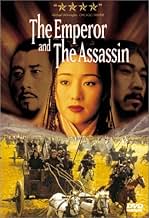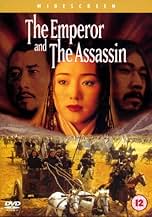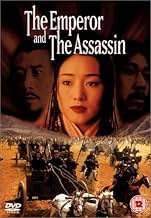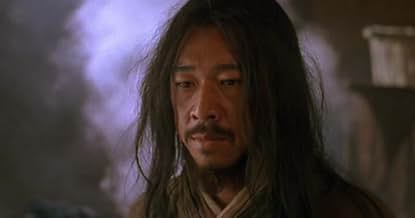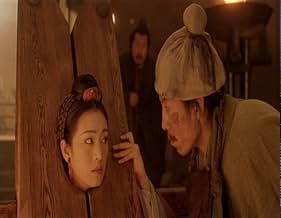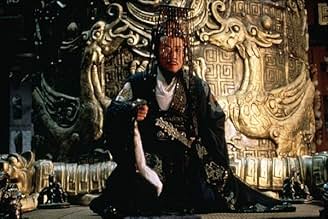PUNTUACIÓN EN IMDb
7,2/10
6,6 mil
TU PUNTUACIÓN
Añade un argumento en tu idiomaIn pre-unified China, the King of Qin sends his concubine to a rival kingdom to produce an assassin for a political plot, but as the king's cruelty mounts she finds her loyalty faltering.In pre-unified China, the King of Qin sends his concubine to a rival kingdom to produce an assassin for a political plot, but as the king's cruelty mounts she finds her loyalty faltering.In pre-unified China, the King of Qin sends his concubine to a rival kingdom to produce an assassin for a political plot, but as the king's cruelty mounts she finds her loyalty faltering.
- Dirección
- Guión
- Reparto principal
- Premios
- 7 premios y 11 nominaciones en total
Reseñas destacadas
After seeing dressed up action films, like the two mentioned above, Emperor and the Assassin was a godsend. This film was such a marvelous blend of action, intrigue, and personality, and I'm sure I'll see it again and again in years to come.
Some of the complaints about the movie have been the golden/brown tint and the quick, disorienting editing. However, I loved both of these qualities in the movie, though the editing did take some time to get used to. A great example of it, is when we're introduced to Jing Ke, the assassin. He is offered an assignment for five thousand, and we see a close up of his face as he demands ten thousand. The next shot shows him with sword drawn, in the house of his victims. That whole introduction to the assassin was marvelously edited, in my opinion. You have to realize that in order to fit the epic plot into just under three hours, a lot of tiny details needed to be cut out. The quick editing also makes the movie seem much shorter than it really is.
Someone said that the swordfighting in the movie (what little of it there was) seemed like high school drama, but I strongly disagree. Most of the action is captured in a few shots, making it seem much more realistic. In so many american films, we see a a flash of a dozen close ups, without getting a feel for what is even happening! Also, the constant use of slow motion in many movies gets so old. By having the fighting in this movie fast and furious, it is much more affecting.
I won't give away the ending, but it was really suspenseful and surprising. I had no idea what would happen (being unfamiliar with Chinese history helped), and was on the edge of my seat! So, to conclude, if you like sweeping historical epics, make sure to see this! I really like the films of Kurosawa, and saw some similarities here, so also if you like his movies, see this!!
Some of the complaints about the movie have been the golden/brown tint and the quick, disorienting editing. However, I loved both of these qualities in the movie, though the editing did take some time to get used to. A great example of it, is when we're introduced to Jing Ke, the assassin. He is offered an assignment for five thousand, and we see a close up of his face as he demands ten thousand. The next shot shows him with sword drawn, in the house of his victims. That whole introduction to the assassin was marvelously edited, in my opinion. You have to realize that in order to fit the epic plot into just under three hours, a lot of tiny details needed to be cut out. The quick editing also makes the movie seem much shorter than it really is.
Someone said that the swordfighting in the movie (what little of it there was) seemed like high school drama, but I strongly disagree. Most of the action is captured in a few shots, making it seem much more realistic. In so many american films, we see a a flash of a dozen close ups, without getting a feel for what is even happening! Also, the constant use of slow motion in many movies gets so old. By having the fighting in this movie fast and furious, it is much more affecting.
I won't give away the ending, but it was really suspenseful and surprising. I had no idea what would happen (being unfamiliar with Chinese history helped), and was on the edge of my seat! So, to conclude, if you like sweeping historical epics, make sure to see this! I really like the films of Kurosawa, and saw some similarities here, so also if you like his movies, see this!!
Chen Kiage (Farewell My Concubine) and Zhang Yimou (Red Sorghum, To Live) have been always considered two of the greatest director of modern China cinema history. This time Chen took three years after his previous film and came back with a movie about the first Chinese emperor Qin and his legendary story with a woman he loves, his adversary and an assassin in very ancient China of 221 BC. Assassin Jingke stab emperor Qin is a well know story that nearly every Chinese know it so well. Assassin Jingke was considered a biggest hero in the history for his great sacrifice spirit and the brave suicide assassination, although his action was failed. Zhang Fengyi is one of my favorite actor (I like his performance in Farewell my concubine), his assassin Jinke is silent and full of passion in the heart, that is convincing. Li Xuejian is honorable actor but just miscast here, His King Qin is always with tears in his eyes and feels miserable. I can not understand why Chen decides to make this most tyranny emperor in the Chinese history always crying. The most attractive role in the movie is Marquis Changxin, he married Qin's mother and most time he looks like idiot but actually he has his own ambitious plan. Marquis Changxin is convincingly played by Wang Zhiwen, I like him so much.
The movie do have some memorable moments, one is Jingke took a assignment to kill the whole family of ironsmith, but when he facing the angelic blind daughter of ironsmith, he cannot do his job. Late, the daughter killed herself. That event had a biggest influence for the rest of Jingke's life, also a big impact for the audience.
The movie has some most popular Chinese comedian (Pan Changjiang for prison officer and Zhao Benshan for Gao Jianli) for the friendly cameo, when they appears in the screen, audience shout and smiled. This would not happened when this movie is showed in country outside China.
I don't know if it is the biggest budget film in China, but it is surely one of them. They built Qin's palace especially for this movie and now becomes a tourist sight. It is near my city. I didn't go there but my father did. He said it is great building.
Overall, this is the excellent movie for the people like ancient Chinese costume and culture. The photography is very beautiful. Compared to the greatest "Farewell My Concubine", Chen does not make it reach that level. I give it *** for the rate from * to ****.
The movie do have some memorable moments, one is Jingke took a assignment to kill the whole family of ironsmith, but when he facing the angelic blind daughter of ironsmith, he cannot do his job. Late, the daughter killed herself. That event had a biggest influence for the rest of Jingke's life, also a big impact for the audience.
The movie has some most popular Chinese comedian (Pan Changjiang for prison officer and Zhao Benshan for Gao Jianli) for the friendly cameo, when they appears in the screen, audience shout and smiled. This would not happened when this movie is showed in country outside China.
I don't know if it is the biggest budget film in China, but it is surely one of them. They built Qin's palace especially for this movie and now becomes a tourist sight. It is near my city. I didn't go there but my father did. He said it is great building.
Overall, this is the excellent movie for the people like ancient Chinese costume and culture. The photography is very beautiful. Compared to the greatest "Farewell My Concubine", Chen does not make it reach that level. I give it *** for the rate from * to ****.
10Anth-8
After watching the movie a few times, I found so many subtle touches and emotions within the dialogue. Jing Ke, the Assassin has become one of favorite movie characters of all time. This fine Chinese actor says more with his eyes and his economy of words and movements then any big screen American actor today. Qin, the Emperor, is brilliant as he leads the audience to believe the kindness in his heart, only to unleash the most cruel acts upon the people around him. The promises he makes with incredible passion and shattered with an evil fist. Gong Li, as in just about every movie I've ever seen her in, is simply fantastic. Her screen dominance is so graceful and emotionally charged.
In case you couldn't tell, I loved this movie.
In case you couldn't tell, I loved this movie.
This is an excellent film. No, it's not Mel Gibson in "Braveheart," but then, it's not trying to be. Actually, "The Emperor and the Assassin" probably has (thankfully) more in common with a Shakespearean production than a Hollywood blockbuster.
In the third century BC, the King of Qin is attempting to unite (in other words "conquer") the seven kingdoms of China. He has already overthrown the Kingdom of Han. Now he needs an excuse to invade the Kingdom of Yan.
This is where the Lady Zhao comes in. She and the King have been friends since childhood. They are obviously very much in love, but cannot marry for political reasons. Together they devise a plot. She will pretend to have fallen into disfavor with the King and escape to Yan. Once there she will convince the Prince of Yan to send an assassin back to kill the King. When the assassination fails, the King will have his excuse to invade Yan.
Once in Yan, however, Lady Zhao begins to reconsider. Hearing and seeing more and more examples of her old childhood friend's ruthlessness, she begins to wonder if the King may need to be assassinated for real.
One sure sign that you're not watching a Hollywood production is the final encounter between the King and the assassin. Unlike a Hollywood movie where the hero and villain are clearly defined and the final outcome already predetermined, this is a fight that could truly go either way.
This is a well crafted and well acted story of a tumultuous time in Chinese history. There is a mixture of both incredible beauty and incredible ugliness. Most beautiful of all, however, is Gong Li as the Lady Zhao. I grow more and more convinced every time I see her that Gong Li is the most beautiful woman in the world.
I must say, however, that she does have one unintentionally funny line in this film. Early on Gong Li asks one of her servants "Do I have a beautiful face?"
Duh!!!
In the third century BC, the King of Qin is attempting to unite (in other words "conquer") the seven kingdoms of China. He has already overthrown the Kingdom of Han. Now he needs an excuse to invade the Kingdom of Yan.
This is where the Lady Zhao comes in. She and the King have been friends since childhood. They are obviously very much in love, but cannot marry for political reasons. Together they devise a plot. She will pretend to have fallen into disfavor with the King and escape to Yan. Once there she will convince the Prince of Yan to send an assassin back to kill the King. When the assassination fails, the King will have his excuse to invade Yan.
Once in Yan, however, Lady Zhao begins to reconsider. Hearing and seeing more and more examples of her old childhood friend's ruthlessness, she begins to wonder if the King may need to be assassinated for real.
One sure sign that you're not watching a Hollywood production is the final encounter between the King and the assassin. Unlike a Hollywood movie where the hero and villain are clearly defined and the final outcome already predetermined, this is a fight that could truly go either way.
This is a well crafted and well acted story of a tumultuous time in Chinese history. There is a mixture of both incredible beauty and incredible ugliness. Most beautiful of all, however, is Gong Li as the Lady Zhao. I grow more and more convinced every time I see her that Gong Li is the most beautiful woman in the world.
I must say, however, that she does have one unintentionally funny line in this film. Early on Gong Li asks one of her servants "Do I have a beautiful face?"
Duh!!!
This three-hour Chinese epic, set in 220 B.C., may ultimately amount to a familiar theme of an Emperor's idealistic dream of peace through unification mutating into corrupted isolation, and there's nothing inherently challenging about the film, but it's a compelling narrative, crammed with intrigue and passion and betrayal and epic events told in vivid strokes. Even for those not drawn to such historical spectacles for their own sake, it's an astonishing feast for the eyes: the scene depicting the coup attempt of the Marquis is one of the most staggering evocations of physical space and grandeur in memory, and the battle scenes are memorable both in their scope and their immediacy. The title sums up the film's use of compelling contrasts - huge plainland vistas set against intimate horrors; the noblest of motives set against the most degraded; hope turning to dust. If you've never seen a three-hour Chinese epic, this wouldn't be a bad place to start.
¿Sabías que...?
- CuriosidadesThe Xianyang palace was reconstructed in its entirety in the city of Dongyang in Zhenjiang province. Much of the film, including the final scene, was shot there. It is now being preserved as a theme park drawing large numbers of tourists. In addition, the capital cities of the other kingdoms featured in the film, Yan Zhao and Han, were constructed as several sights across China. All have been meticulously built to scale with special attention paid to their historical accuracy.
- Versiones alternativasFirst cut was deemed regime-critic by chinese censors and therefore rejected. Approximately 30 minutes were cut to make a more regime-friendly version.
Selecciones populares
Inicia sesión para calificar y añadir a tu lista para recibir recomendaciones personalizadas
- How long is The Emperor and the Assassin?Con tecnología de Alexa
Detalles
- Fecha de lanzamiento
- Países de origen
- Sitios oficiales
- Idioma
- Títulos en diferentes países
- The Emperor and the Assassin
- Empresas productoras
- Ver más compañías en los créditos en IMDbPro
Taquilla
- Presupuesto
- 15.000.000 US$ (estimación)
- Recaudación en Estados Unidos y Canadá
- 1.267.239 US$
- Fin de semana de estreno en EE. UU. y Canadá
- 47.295 US$
- 19 dic 1999
- Recaudación en todo el mundo
- 1.267.239 US$
- Duración2 horas 42 minutos
- Color
- Mezcla de sonido
- Relación de aspecto
- 1.85 : 1
Contribuir a esta página
Sugerir un cambio o añadir el contenido que falta

Principal laguna de datos
By what name was El emperador y el asesino (1998) officially released in India in English?
Responde

